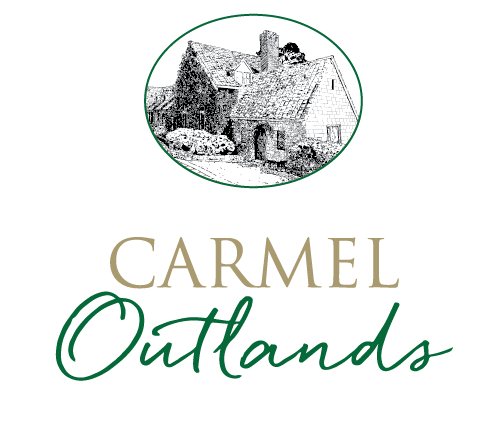On February 27, 2025, Carmel Outlands presented its feasibility study proposal to the Carmel-by-the-Sea City Council at the Annual Strategic Planning Meeting. The video above is of the presentation (3min), the discussion that took place before (1 min) and after the presentation (4min).
Pre-Presentation Discussion: The Challenge of Prioritization
Before the Carmel Outlands presentation, council members and city staff engaged in a discussion about how projects are prioritized. Assistant City Administrator Brandon Swanson and City Administrator Chip Rerig noted that every project requiring city resources must be weighed against other pressing needs, such as the police station, library improvements, and city-wide infrastructure. Councilmember Hans Buder echoed this, expressing concerns about the city’s workload and stating that adding the Flanders Mansion to the priority list this year would take up valuable staff capacity.
A broader discussion unfolded regarding nonprofit-led projects in Carmel. Councilmember Bob Delves emphasized that any proposal for Flanders Mansion should demonstrate solid fundraising commitments beyond aspirational interest. They pointed to other projects in the city that had succeeded by securing millions in pledges before seeking city approval.
Use the arrows to navigate the pitch deck below:
Carmel Outlands Presentation: A Generous Offer with a Limited Window
During the presentation, Carmel Outlands Founder and Executive Director Mike Buffo announced that the organization had secured $61,125 in in-kind contributions from local contractors to conduct a feasibility study at no cost to the city. The study would provide accurate restoration cost estimates, structural assessments, 3D scans, and professional documentation—all of which would be turned over to the city.
Buffo emphasized that the study would not determine the future function of the mansion but would instead equip the city with the necessary data to make an informed decision, whether that be issuing an RFP, leasing, or another course of action.
A key point of the presentation was the time-sensitive nature of the offer. Carmel Outlands’ contractors had committed to making themselves available for 60 days to conduct the study, after which their availability could not be guaranteed. Once access was granted, it would take four months to compile the results and present them to the city by the end of July 2025.
Buffo also took time to directly address misconceptions circulating in the community, clarifying that Carmel Outlands’ board had never endorsed commercializing the property by hosting large-scale events. Instead, their vision centers on a space for small-groups, maintained by a caretaker that would maintain the mansion’s historic integrity while ensuring public benefit.
Post-Presentation Discussion: The City’s Decision
Following the presentation, notably city officials did not acknowledge the thoroughness of Carmel Outlands’ proposal but rather emphasized concerns about staff workload. Assistant City Administrator Brandon Swanson noted that while staff involvement would be minimal, some level of oversight would still be required, including drafting a legal agreement for access, Carmel Outlands would not be officially named as the developer of the property, and ensuring that findings became city property.
Councilmember Buder argued that while he personally wanted to see the Flanders issue resolved during his tenure, 2025 was already overloaded with high-priority projects. He suggested revisiting the proposal in the future rather than opening “Pandora’s box” at this time.
Councilmember Allisandra Dramov raised concerns about the feasibility study being conducted by an external group rather than the city itself, suggesting that the results could be biased. The council also debated whether an independent city-led study would be preferable to a feasibility study conducted by Carmel Outlands, with some members suggesting that an external assessment could be perceived as biased. She also mentioned the importance of resident concerns about traffic and access to the mansion.
Without conducting a vote, the council decided not to prioritize the feasibility study at this time, effectively halting progress on the proposal. Mayor Dale Byrne expressed disappointment, stating that the offer represented a “low-hanging fruit” opportunity to gain valuable data on the property at no cost. He was perplexed as to why the council did not see the value in accepting the donation.
What Comes Next?
While the city did not outright reject the feasibility study, it also did not approve moving forward. This leaves Carmel Outlands at a crossroads.
It has been suggested that a potential path forward could be opening the two-day property access window to multiple organizations, rather than limiting it to Carmel Outlands, in an effort to make the findings more inclusive.
For now, Carmel Outlands’ offer remains open for 60 days (closing April 25, 2025). If no action is taken within that time, the in-kind contributions secured for the study may no longer be available, and the organization will have to consider whether it is viable to continue its efforts.
This outcome was disappointing for those who have worked tirelessly to bring forward a realistic and community-driven approach to restoring the Flanders Mansion. However, it has also underscored the need for further dialogue, clearer city priorities, and an ongoing commitment to historic preservation.
Carmel Outlands will continue to evaluate next steps and engage with community members about the best path forward.
—
What do you think about the city’s decision? Should the feasibility study move forward? Share your thoughts with us.
